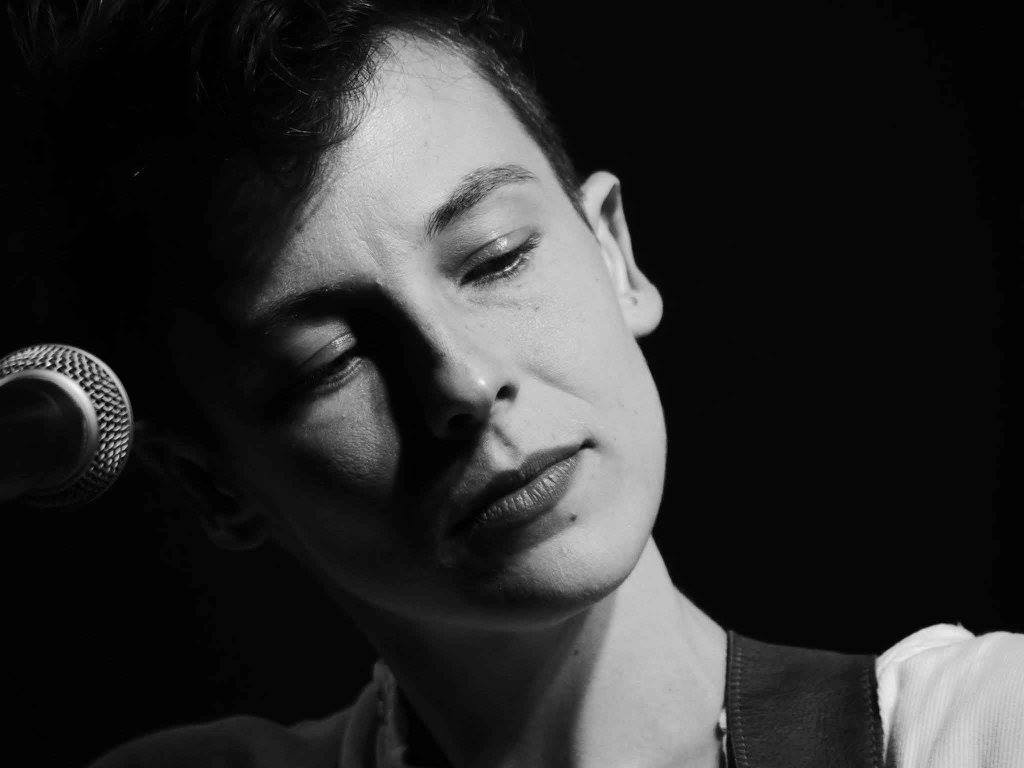Q&A With Rhiannon Scutt
By Christopher Treacy

Rhiannon Scutt’s “Audrey” took our current Roundup Song of the Week honors, and one of its more captivating qualities is how it articulates non-romantic love. “Audrey” is built on admiration and respect, which inspires a different kind of loving devotion. The song touches on our ideas of identity through heritage as well as the way that stories, passed down from prior generations, can inform our perceptions of self—whether they’re true or not. The truth is almost beside the point.
Scutt’s based out of Sheffield, UK, and dabbles in a few musical projects, including the portrayal of Devo front man Mark Mothersbaugh in the tribute band We Are Not Devo (how cool is that?!). She’s just released a trio of EPs, Facets 1-3, and “Audrey” shows up in the second volume. We got to ask her a few questions about family, identity, and the unusual format she chose for her first official release.
“Audrey” plays out like a love song, but it’s not romantic love… seems more built on admiration. Can you talk a bit about the dynamic between the narrator and the person she’s singing about?
Audrey was my great aunt, and she died very young, shortly after marrying. But she lived on in the tales my Nanan would tell. The first half of the song is written from my Nanan’s perspective—the younger sister, witnessing, but without full comprehension of Audrey’s plight. The second half is from my own perspective, looking backwards, again without real knowledge of the story. They’re just secondhand memories, but they’re so wrapped up in emotion for me despite them not being my own. It’s the one song of mine that occasionally catches me off guard and chokes me up when I’m performing live.
“I have strangers for ancestors, I have nameless great grandchildren, of all of those I wish I could know you.” Ancestry has become a craze. People have become more aware of their heritage through the advancement of DNA technology. While this is definitely cool, I wonder if it doesn’t always deliver that sense of belonging that folks are after. To me, this line speaks to that a little: since we can’t know these people, but are made aware of their existence, do we wind up with more questions than we had initially?
I think knowing one’s ancestry and heritage is a great privilege. Knowing that my paternal family has been on a particular patch of land for generations gives me great comfort and a sense of belonging geographically. Conversely, the migration of my maternal Grandad from Ireland to England gives me a real sense of connection to Ireland, somewhere I personally know very little, yet still feel a strong affinity for. I think the migration of people only makes us more interconnected, culturally, and spiritually richer.
“Living up to a ghost can weight heavy…” Indeed it can, particularly when all you have to go on are loose details. But having role models can be so affirming, especially in a world where so many of our heroes fall from grace. Maybe it’s easier, in that sense, to have a role model who has passed? We can glorify them and there’s less of a chance that their image will somehow get tarnished.
The qualities in Audrey which weaved through my Nanan’s stories appealed to me, and they’re qualities I didn’t think I had a great deal of when I wrote this song. Audrey was fierce, determined, had more than a little temper, and knew how to hold her own. I grew up in admiration of this person I’d never met, in awe of her actions and attitudes… not realizing, as a child, the glorification that is naturally bestowed upon people once they’re gone.
Your debut, Facets, is divided into 3 segments. Did you enter into the process of making it with that in mind, or did it take shape as 3 distinct pieces as you went along? Was it impossible to imagine as one multi-faceted album?
Back in 2019, I recorded what I thought would be my first studio album. As time, the pandemic, and I have progressed over the years since then, it became clear that perhaps a different approach was necessary, to share what I had captured in those magic recording sessions. The shifting genres, the themes, the moments in my life when I had written these songs were all part of me, yet somehow it felt as if just one album would be missing an opportunity to explore how music manifests for me. So, rather than shy away from these multiple facets of self that we all no doubt embody, I embraced it conceptually in the approach to sharing the work, through three 4-track EP’s.
Facets is an interconnected trio of releases that stand alone as individual EP’s, but when put together as a whole, reflect the variety of songwriters, selves and musicians that all inhabit this body and mind of mine.
Christopher Treacy has been writing about music and the music industry for 20 years. He’s contributed to The Boston Phoenix, The Boston Herald, Nashville Scene, and Berklee College of Music’s quarterly journal, as well as myriad LGBTQ+ outlets including the Edge Media Network, Between the Lines/Pride Source, Bay Windows and In Newsweekly. He lives in Buffalo, NY.
Got new music? Submit it to CQ.